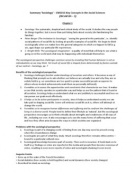Summary ‘Sociology’ – CM1013 Key Concepts in the Social Sciences
(IBCoM BA – 1)
Chapter 1
Sociology: the systematic, skeptical and critical study of the social. It studies the way people
do things together, but is more than just listing facts about society (de-familiarizing the
familiar)
Peter Berger (The Invitation to Sociology) : ‘seeing the general in the particular’, i.e. identify
social patterns of social life by looking at specific examples of social life. We begin to think
sociologically when we realize how the general categories in which we happen to fall (e.g.
sex, age) shape our particular life experiences.
C. Wright Mills ‘The sociological imagination’: a quality of mind that will help to see what is
going on in the world and what may be happening with individuals themselves
The sociological perspective challenges common sense by revealing that human behavior is not as
individualistic as we may think. Yet much of social life is shaped (even determined) by factors outside
of our control – Sociology, pp. 7
Benefits of the sociological perspective
1. Sociology challenges familiar understandings of ourselves and others. It becomes a way of
thinking that prompts us to ask whether our believes are actually true and why they are so
widely held (e.g. we sometimes are too quick to praise successful people as superior to
others whose modest achievements mark them as personally deficient).
2. It enables us to assess the opportunities and constraints that characterize our lives. It makes
us see that society operates in a particular way and helps us see the pattern that is found in
all societies. Sociology helps us understand what we are (un)likely to accomplish and how we
can pursue our goals most effectively.
3. It helps us to be active participants in society, since it helps us understand society we can
take part in shaping social life. Some will embrace social life as it is, others will attempt ot
change the world.
4. It enables us to recognize human differences and suffering and to confront the challenges of
living in a diverse world. People tend to define their lifestyle as ‘natural’, but the sociological
perspective encourages us to think critically about strengths and weaknesses of all ways of
life ; including our own. It also encourages us to see the many forms of suffering that occur
and how they often arise because the ways in which societies are organized.
Problems with the sociological perspective
1. Sociology is part of a changing world. A finding from one day may soon be proved wrong
when the circumstances change.
2. Sociologists are part of what they study. Much sociology therefore remains ethnocentric –
bound to a particular cultural view.
3. Sociological knowledge becomes part of society. Their work is recursive: it feeds back on to
itself (e.g. findings on crime are reported in the media and people then become conscious of
crime, resulting in even more reports of crime and sociologists studying it even more)
Auguste Comte
> Grew up in the wake of the French Revolution
> Social statistics (how society is held together) and social dynamics (how society changes)
> Described his study as sociology
,> Human efforts to understand the world – 3 different stages:
A. Theological stage: thoughts about the world were guided by religion – society was regarded
as an expression of God’s will
B. Metaphysical stage: people came to understand society as a natural (rather than
supernatural) phenomenon.
C. Scientific stage: final stage – the scientific approach , first used to study the physical world,
was applied to the study of society
> Positivism: a means to understand the world based on science
Sociology was born out of the ‘massive social transformation’ of the past two centuries
A new industrial economy: the growth of modern capitalism
During the middle ages, people engaged in small-scale manufacturing, but by the end of the
18th century inventors had applied new sources of energy (first water power and then steam
power) to the operation of large machines which then gave birth to factories. Workers
became part of large factories and this change in the system of production generated
poverty and mass suffering, while demoralizing societies.
The growth of cities
Factories across much of Europe attracted people in need of work. Landowners also fenced
of more and more ground, turning farms into grazing land for sheep and this ‘enclosure
movement’ forced many farmers t look for work in the city. Villages were soon abandoned
and factory towns grew. Widespread problems (such as poverty, disease and crime) were the
order of the day.
Political change – control and democracy
In the writings of Locke and Adam Smith, we see a shift in focus from people’s moral
obligations to remain loyal to their rules, to the idea the society is the product of individual
self-interest. The key phrases in the new political climate were therefore ‘individual liberty’
and ‘individual rights’. Each individual has certain rights (i.e. life, liberty and the pursuit of
happiness)
The loss of Gemeinschaft – the eclipse of community
Toennies argued that the Industrial Revolution had undermined the strong social fabric of
family and tradition by fostering individualism and an emphasis on facts and efficiency. The
modern world turned societies inside-out so that, as Toennies put it, people are ‘separated in
spite of uniting factors’ (the world of Gesellschaft where people live among strangers and
people put their personal needs ahead of group loyalty).
Cyber Revolution – suggestions to describe this rapid change
o The digital age: shift from analogue to digital and miniaturization of these technologies which
can now be found in all the smallest gadgets of everyday life
o The cyborg age: highlights the ways in which humans are becoming more and more adapted
to live with all manner of technologies
o The information age: highlights the rapid growth of production and availability of all kinds of
data.
o The network society: highlights the ways in which new ways of communicating have
developed.
o The virtual age: highlights the mediated nature of reality; the 21st century world is less direct
and instead mediated through some technology
Chapter 2
Theory: a statement of how and why specific facts are related
Theoretical perspectives: basic images that guide thinking and research
, The classical perspectives of sociology
The functionalist perspective
Spencer (English philosopher, 1820 – 1903) reasoned that various social structures are
interdependent, working in concert to preserve society. This perspective organized
sociological observations by identifying various structures of society and investigating the
functions of each one. Major US proponent of the functional perspective, Parsons treated
society as a system; identifying the basic tasks that all societies must perform to survive and
the ways they accomplish these tasks. Robert Merton further expanded social function: 1)
The consequences of any social pattern will differ for various members of a society 2) people
rarely perceive all the functions of a social structure (e.g. many people do not realize that
they do not only go to university to get the skills they need in the workplace, but university
can also be a chance to meet new people and to reinforce a system of prestige) 3) not all
effects of social structure turn out to be useful
CRITICIAL COMMENT
- Functional perspective > view on society as a whole being comprehensible and stable > how
can we assume that society has a ‘natural’ order when social patterns vary from place and
change over time?
- By emphasizing social integration, functionalism tends to gloss over inequality based social
class, race, ethnicity and gender > conservative character
Functionalism: a framework for building theory that sees society as a system whose
parts work together and interconnect – often to promote solidarity and stability
Social structure: relatively stable patterns of social behavior. Social structures give
shape to the family and direct people to exchange greetings on the street etc.
Social functions: consequences of social patterns for the operation of society
Manifest functions: the recognized and intended consequences of any social pattern
Latent functions: consequences that are largely unrecognized and unintended
Social dysfunctions: any social pattern’s undesirable consequences for the operation
of society
The conflict perspective
This is a framework for building theory that sees society as an arena of differences and
inequalities that generate conflict and change. This perspective complements the functional
perspective by highlighting not solidarity but division (based on different interests and
potential inequality). Typically, those on top strive to protect their privileges; the
disadvantaged attempt to gain more resources for themselves. Many sociologists who
embrace this perspective attempt not just to understand society but to reduce social
inequality (this was the goal of Karl Marx: ‘The philosophers have only interpreted the world,
the point, however, is to change it!’).
CRITICAL COMMENT
- This perspective highlights inequality and divisions and glosses over how shared values or
interdependence generate unity among members of a society.
- This approach explicitly pursues political goals and therefore can relinquish any claim to
scientific objectivity; they contend, on the contrary, that all theoretical approaches have
political consequences (albeit different ones)
- This perspective (and the functionalist perspective too) envisage society in broad terms; it
becomes a thing in itself, describing our lives as a composite of (e.g.) family, social class and
so on.
The social action perspective





